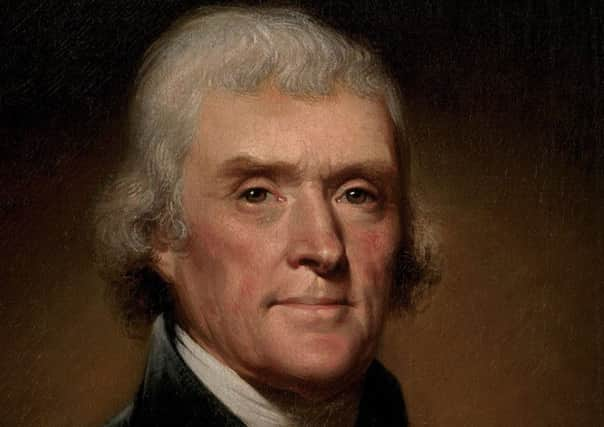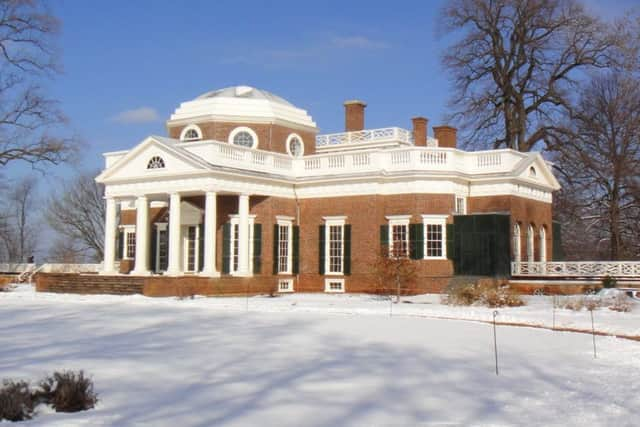Did Thomas Jefferson really believe that all men were created equal?


Thomas Jefferson is buried in the grounds of Monticello, the beautiful but quite modest plantation house/villa which he himself designed with some inspiration from 16-century Italian architect Andrea Palladio.
Predictably Jefferson crafted his own epitaph, highlighting the achievements for which he wished to be remembered: ‘Here was buried Thomas Jefferson, author of the declaration of American independence, of the Statute of Virginia for religious freedom, and father of the Univerity of Virginia.’
Advertisement
Hide AdAdvertisement
Hide AdAlthough he was American minister in Paris (1785-89), George Washington’s secretary of state (1789-93), John Adams’ vice-president (1797 -1801) and the third president (1801-09), Jefferson chose not to mention any of these great offices in his epitaph.


Jefferson was a polymath, a point amusingly made by President Kennedy at a dinner in the White House to honour Nobel laureates from the Western hemisphere in April 1962 when he observed: “I think this is the most extraordinary collection of talent, of human knowledge, that has ever been gathered together at the White House, with the possible exception of when Thomas Jefferson dined alone. Someone once said that Thomas Jefferson was a gentleman of 32 who could calculate an eclipse, survey an estate, tie an artery, plan an edifice, try a cause, break a horse, and dance the minuet.”
Privately Jefferson could be charming but he was an essentially remote and aloof figure. He was more interested in humanity in the abstract than in his fellow human beings.
He was a poor public speaker but on paper he was a superb wordsmith. His encyclopaedic knowledge and his fluent pen made him the ideal man to draft the Declaration of Independence.
Advertisement
Hide AdAdvertisement
Hide AdFew can fail to be impressed by this striking passage taken from the preamble: “We hold these truths to be self-evident; that all men are created equal; that they are endowed by their Creator with certain inalienable rights; that among these are life, liberty and the pursuit of happiness; that to secure these rights, governments are instituted among men, deriving their just powers from the consent of the governed; that whenever any form of government becomes destructive of these ends, it is the right of the people to alter or abolish it, and to institute new government …”
Yet these inspiring words were drafted by a Virginian slave owner. Jefferson’s elegant lifestyle at Monticello wholly depended on the labour of dozens of Negro slaves.
Over the course of his life he would have owned about 600 slaves. Did Jefferson really believe that all men were created equal?
He condemned slavery in his ‘Notes on the State of Virginia’ in 1785, calling slavery a moral evil for which the nation would ultimately have to account to God.
Advertisement
Hide AdAdvertisement
Hide AdIt would appear that he favoured gradual emancipation, although some question his sincerity.
He failed to win support for abolition in Virginia and remained a slave owner to his dying day, probably because he could not afford to free his slaves.
It is not anachronistic to query Jefferson’s views on slavery. As early as 1775 Dr Samuel Johnson had posed the pertinent question: “How is it that we hear the loudest yelps for liberty among the drivers of Negroes?”
In 1776, responding to the text of the Declaration, the British abolitionist Thomas Day, mocked its hypocrisy: ‘If there be an object truly ridiculous in nature, it is an American patriot, signing resolutions of independency with the one hand, and with the other brandishing a whip over his affrighted slaves’.
Advertisement
Hide AdAdvertisement
Hide AdJefferson drafted Virginia’s Statute of religious freedom as early as 1777 but it was only adopted in 1786. It made compelling attendance or contributions to any state-sanctioned religious establishment illegal and declared that men “shall be free to profess ... their opinions in matters of religion”.
Jefferson was raised as an Episcopalian but had become a Deist – like so many of the ‘Founding Fathers’.
As far as Jefferson was concerned, “it does me no injury for my neighbour to say there are twenty gods, or no God. It neither picks my pocket nor breaks my leg”.
Virginia’s Statute of religious freedom was the precursor of the First Amendment of the US Constitution.
Advertisement
Hide AdAdvertisement
Hide AdThe First Amendment states: ‘Congress shall make no law respecting an establishment of religion, or prohibiting the free exercise thereof…’
Jefferson regarded this amendment, adopted on December 15 1791, as having built “a wall of separation between Church and State”, a formula often cited by the Supreme Court in its adjudications.
Jefferson’s unorthodox religious beliefs were an issue in the presidential election of 1800. The Federalists accused him of being an atheist, which in fairness he was not. In 1802 Jefferson wrote to the Danbury Connecticut Baptist Association “that religion is a matter which lies solely between Man and his God”.
In 1819 Jefferson founded the University of Virginia at Charlottesville. It was not aligned with any denomination and was established without a divinity school. The campus was significantly built around a library rather a chapel to emphasise that it was a secular rather a religious institution.
Advertisement
Hide AdAdvertisement
Hide AdAs president, Jefferson’s greatest achievement was the Louisiana Purchase of 1803, by which he acquired from France an area roughly defined by the Missouri and Mississippi watersheds.
The acquisition doubled the size of the United States. The Lewis and Clark expedition of 1804-06 brought back the first scientific and economic knowledge of territory purchased sight unseen.
Another legacy of Jefferson was the new Library of Congress. After the British burned down the building in 1814 during the Anglo-American War of 1812, Jefferson sold Congress his personal library, accumulated over half a century, and it became the nucleus of the new library. This is why if you visit Monticello you find the bookshelves empty.
Jefferson died on July 4 1826, the 50th anniversary of the Declaration of Independence.
Americans have an unrivalled passion for ranking everything, including their presidents. Jefferson consistently features in lists of those deemed to be the six greatest US presidents.